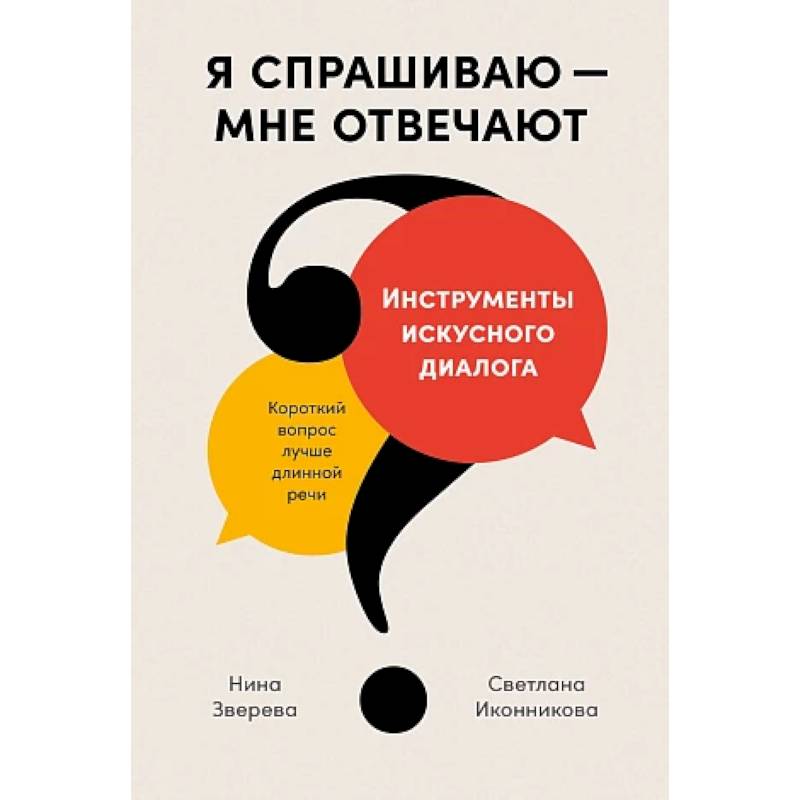I ask, I am answered. Tools of skillful dialogue
Please sign in so that we can notify you about a reply
• Master class on improving business and social communication skills.
• Authors - renowned specialists in communication, communication psychology, and rhetoric.
• The book teaches how to ask questions that people want to answer and how to answer any, even the most provocative questions.
• Practical examples, real stories that help better understand the secrets of empathetic communication.
What do you think is most important in communication? Maybe the ability to look good, proper speech, or ease? Nina Zvereva and Svetlana Iconnikova, specialists in communication, communication psychology, and rhetoric, believe that the most important thing in communication is questions. With the help of questions, you can support a conversation partner or provoke them, make them think or feel sympathy towards you. And answers allow you to establish friendly communication or, conversely, build a wall of alienation. This book is for everyone who wants to learn the art of dialogue: for parents who want to find common ground with their teenagers, journalists, HR department employees, public officials, or company executives. From it, you will learn what a "straightforward question" is, who should not be asked questions during a social conversation, and how to brilliantly answer an uncomfortable question.
Quotes
'A simple test of the ability to communicate with people consists of just one phrase. Do you ask questions?'
'A question is a manifestation of interest in another person. Even a banal "did you have breakfast?" already means: you have been noticed, you are being asked about.'
'If you understand for sure that a question was deliberately formulated to hurt you, you can choose not to answer the troll, but explain to the listeners or readers why he is asking about it.'
'Roman Abramovich has not been answering journalists' questions for decades. Even if they sound completely harmless (and sometimes complimentary), he perceives them as background noise. Occasionally, once every few years, he gives interviews, but no one knows how long the process of coordinating the media, interviewer, questions, and answers takes...'
'The most important thing is to prepare as thoroughly as possible for meetings with residents, employees, and shareholders. Do you feel that they may ask you unpleasant questions? Start your presentation with them.'
For whom
This book is for everyone who wants to learn the art of dialogue: for parents who want to find common ground with their teenagers, journalists, HR department employees, public officials, or company executives.
• Authors - renowned specialists in communication, communication psychology, and rhetoric.
• The book teaches how to ask questions that people want to answer and how to answer any, even the most provocative questions.
• Practical examples, real stories that help better understand the secrets of empathetic communication.
What do you think is most important in communication? Maybe the ability to look good, proper speech, or ease? Nina Zvereva and Svetlana Iconnikova, specialists in communication, communication psychology, and rhetoric, believe that the most important thing in communication is questions. With the help of questions, you can support a conversation partner or provoke them, make them think or feel sympathy towards you. And answers allow you to establish friendly communication or, conversely, build a wall of alienation. This book is for everyone who wants to learn the art of dialogue: for parents who want to find common ground with their teenagers, journalists, HR department employees, public officials, or company executives. From it, you will learn what a "straightforward question" is, who should not be asked questions during a social conversation, and how to brilliantly answer an uncomfortable question.
Quotes
'A simple test of the ability to communicate with people consists of just one phrase. Do you ask questions?'
'A question is a manifestation of interest in another person. Even a banal "did you have breakfast?" already means: you have been noticed, you are being asked about.'
'If you understand for sure that a question was deliberately formulated to hurt you, you can choose not to answer the troll, but explain to the listeners or readers why he is asking about it.'
'Roman Abramovich has not been answering journalists' questions for decades. Even if they sound completely harmless (and sometimes complimentary), he perceives them as background noise. Occasionally, once every few years, he gives interviews, but no one knows how long the process of coordinating the media, interviewer, questions, and answers takes...'
'The most important thing is to prepare as thoroughly as possible for meetings with residents, employees, and shareholders. Do you feel that they may ask you unpleasant questions? Start your presentation with them.'
For whom
This book is for everyone who wants to learn the art of dialogue: for parents who want to find common ground with their teenagers, journalists, HR department employees, public officials, or company executives.
Author:
Author:Zvereva N.,Iconnikova S.
Cover:
Cover:soft
Category:
- Category:Business & Money
- Category:Medical Books
Publication language:
Publication Language:russian
Paper:
Paper:offset
Dimensions:
Dimensions:21.5x14.5x1.4 cm
Series:
Series:-
Age restrictions:
Age restrictions:12+
ISBN:
ISBN:978-5-9614-8640-7
No reviews found
